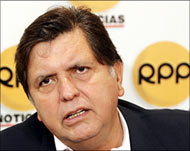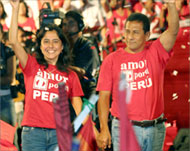Peru votes in tight three-way race
Peruvians are heading to the polls to decide a tight three-way race to be the country’s next president.

More than 16 million registered voters will take part in an election on Sunday that is a contest between a nationalist former general, a centre-left former president and a conservative lawyer seeking to be the country’s first female leader.
A final opinion poll on Saturday showed that the former army commander, Ollanta Humala, with 27% of the vote, held a slight lead over Alan Garcia, the former president, who had drawn level in second with the candidate seen as most pro-business, Lourdes Flores, with 23% each.
None of the three front-runners nor the 17 other candidates running is expected to achieve the 50% support needed for outright victory in the first round, meaning the top two will face a run-off in late May or early June.
Chavez fan
Humala has led a direct and outspoken campaign that has tapped into discontent among Peru’s poor majority.
He led a failed coup in 2000, months before the 10-year rule of Alberto Fujimori, the former president, collapsed and is an admirer of Peru’s 1968-75 left-wing dictatorship of General Juan Velasco as well as Venezuela’s president, Hugo Chavez.
 |
|
Garcia says he has learnt from |
Humala has campaigned to increase state involvement in the economy and block a free trade agreement with Washington.
However, comments from his mother, including calls for corrupt politicians to be shot, have provoked criticism from his two rivals and worried investors.
A Garcia presidency would represent a more moderate shift to the left for Peru and he models himself after liberal figures such as Chile’s newly elected president, Michelle Bachelet.
He says he has changed since the days of his presidency when he became the country’s youngest leader in 1985, aged 36 years.
Economic shambles
His five years in power was characterised by hyperinflation and mismanagement that left Peru’s economy in a shambles.
However, he is a skilled campaigner and orator, who lost to outgoing President Alejandro Toledo in 2001’s election.
Garcia secured second place in that race ahead of Flores.
 |
|
Flores has the backing of |
She is backed by the business community, but has been forced to fend off claims that she is the candidate of wealthy Peruvians and has struggled to connect with the country’s poor majority.
Garcia and Flores have tried to stress to Peruvians that they must choose between stability and the threat of chaos they say Humala represents.
However, Humala’s populist message appears to have struck a chord with millions of impoverished voters who often feel they have not benefited from the country’s economic growth, which has averaged 5% over the past four years.
‘Vote constructively’
Toledo, who is unable to stand for re-election, urged Peruvians in a veiled attack on Humala to “vote constructively, so that however much or little we have advanced is not lost.”
“Think about freedom of expression, human rights. Be sure the person (you vote for) doesn’t represent the authoritarianism and the instability of the past.”
 |
|
Humala’s populist tone has |
More than 160,000 police and military troops have been mobilised to guarantee security during the voting, in which members of the armed forces will be allowed to participate, for the first time in about 150 years.
Voters will also elect a 120-seat congress, where Garcia’s APRA party, Peru’s oldest, dominates opinion polls.
As is customary during national elections in Peru, public gatherings will be prohibited during voting and cinemas will only open after voting closes.
The ban has forced Roman Catholic churches to reschedule Masses and processions marking Palm Sunday.